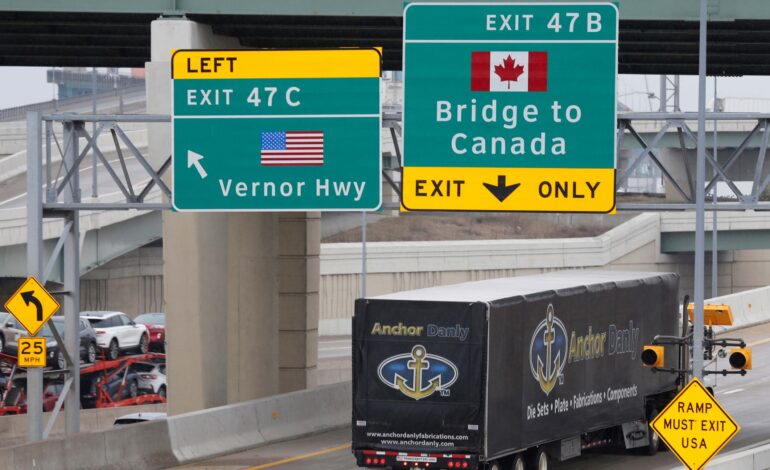After a 19-month lockdown on nonessential travel, the U.S. will reopen its borders with Canada and Mexico to fully vaccinated travelers, starting in November
Mexico and Canada, as well as Americans themselves, have asked the U.S. government for months to ease restrictions on nonessential travel across borders. Though commercial trade was allowed, nonessential travel for leisure or to visit family across borders was restricted. Michigan is one such border state that was affected by the travel restrictions to Canada.
AP reports that travelers entering the U.S. by vehicle, rail and ferry will be asked about their vaccination status as part of the standard U.S. Customs and Border Protection admissions process. At officers’ discretion, travelers will have their proof of vaccination verified in a secondary screening process. No testing will be required to enter the U.S. by land or sea, unlike air travel, which requires proof of a negative test.
On Wednesday, U.S. Rep. Debbie Dingell (D-Dearborn) commended the Biden administration for opening the border to nonessential travelers.
“Throughout the pandemic, my team and I have spoken with so many distressed families, workers and businesses in Michigan who have been separated from families and friends and are also reaping the financial impacts of little to no travel and tourism,” Dingell said. “This new safe and evidence-based strategy for reopening international travel will not only allow families and friends to reunite, but will also boost the economy in Michigan and across the country.”
Dingell had supported a reopening strategy between the U.S. and Canada throughout the pandemic, most recently sending a letter with her colleague, Rep. Haley Stevens (D-Rochester Hills), to President Biden, urging for the adoption of an evidence-based strategy to safely reopen international travel along the northern border.
Governor Whitmer said that reopening the border will aid “Michigan’s economic momentum.” Lansing says the state had the third-highest GDP growth in the second quarter of the year and has a $3.5 billion surplus to invest in residents.
“I look forward to welcoming our neighbors as they cross the Ambassador Bridge or Detroit-Windsor Tunnel into Detroit, the Blue Water Bridge into Port Huron, or the Sault Ste. Marie International Bridge into Sault Ste. Marie,” Whitmer said.
Following a large spike over the summer due to the highly-contagious Delta variant of COVID-19, the country has seen a drop in cases to about 85,000 a day. The federal government’s new procedures target individual risks of contracting and spreading the virus, rather than less targeted country-based bans.
The U.S. Department of Labor is looking to place emergency regulation that will require employers of 100 workers or more to demand their employees be vaccinated against COVID-19 or tested weekly. Recently, the White House has moved to impose sweeping vaccination-or-testing requirements that affect as many as 100 million people in the U.S. in an effort to encourage holdouts to get shots.
The Center for Disease Control and Prevention says it will accept travelers coming from outside countries who have gotten full doses of any World Health Organization-approved vaccine, not just the three currently available in the U.S. Canada allows entry of fully-vaccinated individuals with proof of vaccination against COVID-19 as well as proof of a negative test conducted within 72 hours of entry to the country.
Last month, the U.S. announced it will end country-based travel bans for air travel and instead require vaccination for foreign nationals seeking to enter by plane. Mexico has not put in place any COVID-19 entry procedures for travelers, though there have been restrictions on activities based on COVID-19 outbreaks in the country itself. Americans have traveled to that country for vacations constantly throughout the pandemic.
— Wire and staff






Leave a Reply